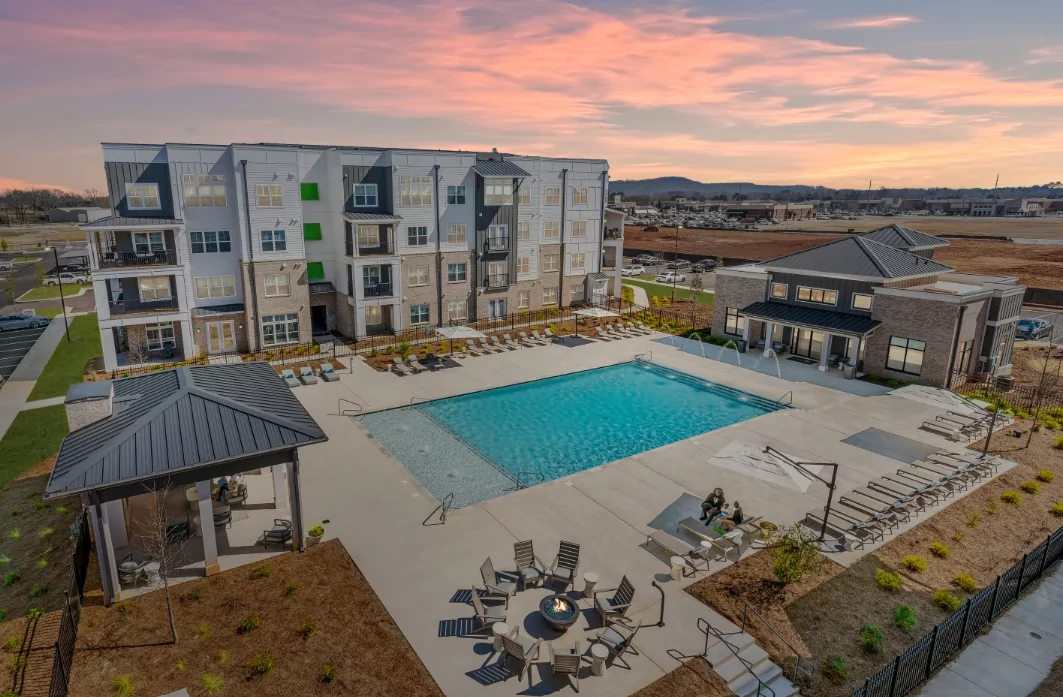DST Offering Detail
Carter Exchange Station at Clift Farm DST

DST Offering Highlights
Carter Exchange Station at Clift Farm DST is a 315-unit apartment community located in Madison, Alabama – 15 minutes west of downtown Huntsville, AL. Newly constructed in 2021, Station at Clift Farm is in the final stages of the leasing stabilization period with current occupancy of 83.8%. Tenants have access to a resort-style saltwater pool, outdoor seating areas equipped with grilling stations and fire pit, a roof deck lounge and patio, 24-hour fitness center, a cybercafé, covered parking and electric vehicle charging stations. Additionally, the DST’s business plan is to maintain high occupancy levels through a multiplatform marketing program and enhance property performance using a revenue and lease expiration management system. The Station at Clift Farm community is located in the Huntsville MSA, the second largest MSA in Alabama. The MSA is one of the fastest-growing metros in the U.S., growing approximately 18% over the past decade. The region boasts an affordable cost of living, moderate climate, and desirable lifestyle amenities.
| Property Status: | Closed Offering |
|---|---|
| Property Type: | Multi-Family |
| Property State: | Alabama |
| Property City: | Huntsville |
| Properties: | 1 |
| Units: | 315 |
| Offering Size: | $112,442,166 |
| Equity Offering: | $69,424,166 |
| Loan-to-Value: | 38.26% |
| Loan Terms: | 10-yr Fixed, 7-yr Interest Only at 4.32% |
| Cash Flow: | Call to Confirm |
About Carter Exchange
Carter Exchange is a Carter Funds company backed by a team of experts with decades of real estate investment experience and established relationships in both the broker/dealer and real estate brokerage communities. Their investment strategies center around high-growth industries, risk-adjusted returns, a commitment to excellence, and transparent communication.
Benefits of a Delaware Statutory Trust
Delaware Statutory Trusts are a popular 1031 Exchange replacement property option that allows for fractional ownership of high-quality institutional properties acquired by and managed by large real estate firms, referred to as DST sponsors. DSTs provide a unique and flexible solution to investment property owners who want to defer tax and continue to own investment property without the management requirements of directly owned property. Below are some of the benefits of investing in DST real estate.
- Tax Savings: DSTs allow for the deferral of federal capital gains tax, state capital gains tax, net investment income tax, and depreciation recapture tax. The tax savings can be significant, especially in states where the potential tax liability can be as high as 42%.
- Monthly Income Potential: DSTs are structured with an emphasis on cash flow for investors and typically include high-quality institutional property.
- Eliminate Active Property Management: Ownership of a DST is entirely management free.
- Eliminate Tax for Estate Beneficiaries: DSTs allow for a “step-up in basis” upon the passing of an owner (elimination of Capital Gains, Depreciation Recapture, and Net Investment Income Tax).
- Low-Cost Non-Recourse Debt Matching: Most investors have debt that must be matched in their exchange, therefor many DSTs are structured with debt in place.
- Low Risk of a Failed 1031 Exchange: Extensive DST property due diligence is prepared in advance and DST closings can occur quickly – in a matter of days.
DST Risks
DSTs offer many benefits however they are not suitable for everyone and come with risks. Therefore, DSTs are only available to accredited investors. Before deciding to invest in DST real estate, carefully consider the following considerations: Lack of liquidity, timing of exit, lack of control, and interest rates can affect financing, leasing, and appreciation. Additionally, loan modifications may not always be possible, cash flow is not guaranteed, and projected appreciation may not occur. There are also management costs and fees associated with owning DSTs which are disclosed in the prospectus. While not a precisely defined term, a high grade, institutional-grade, or institutional-quality property generally refers to a property of sufficient size and stature to merit attention from large national or international investors.


